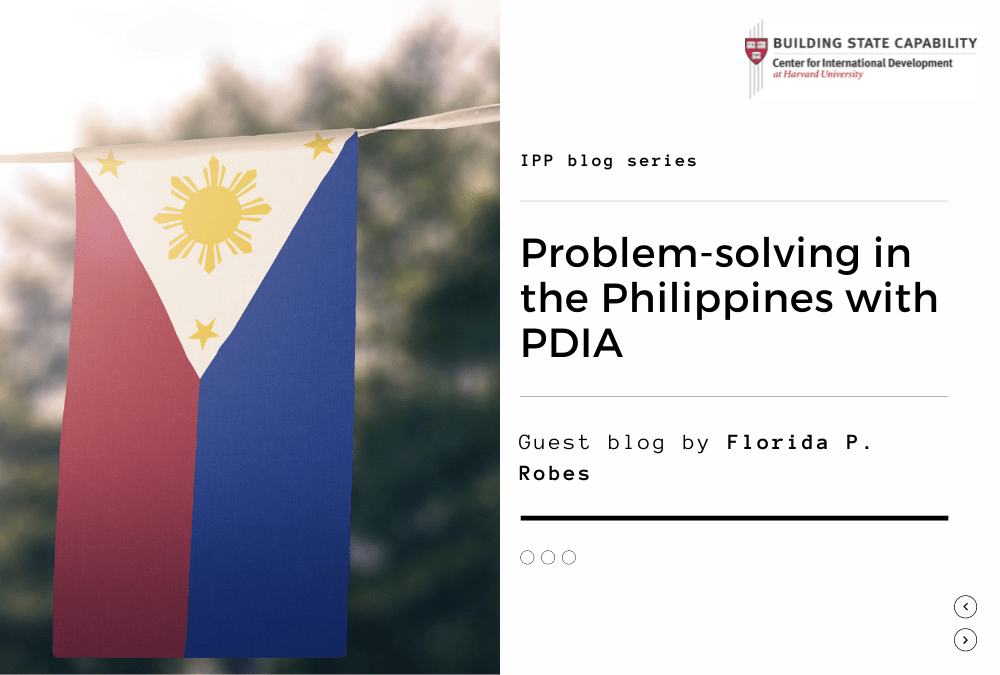Guest blog by Florida P. Robes
Enrolling in Harvard Executive Education, specifically availing the “Implementing Public Policy Online” certificate course is one of the best decisions I have made in my entire life for three main reasons. First, it made me strong amidst the COVID-19 pandemic, being able to virtually interact with like-minded people interested in public policy has been a solid emotional support system. Second, I have learned how to utilize the Problem Driven Iterative Approach (PDIA), which has my holy grail as a legislator. Third, I find the 4P’s leadership model as a very useful tool to analyzing public policy, which I am currently applying to convince stakeholders to lobby for my “Government Pre-Audit Act of 2020”.
First, the COVID-19 pandemic has brought extreme mental and emotional stress to me as an incumbent elected leader. The Philippines has been responding poorly to the pandemic, with poor rates of mass testing and a totally unprepared health care system. Taking this course made refocus on the things that matter most, and that is to understand the problem and take baby steps to solve it, through PDIA. I am blessed to have a virtual support from Harvard Executive Education and my peers in the class, sharing their personal experiences and opinions on the content of the course.
Second, I found the PDIA approach very striking and unique. To comprehensively and effectively solve the problem at hand, PDIA offers a very useful method. In my case, my issue is the widespread corruption in the due to the loopholes in the auditing mechanism of the Commission on Audit. As PDIA stated, the problem must be deconstructed, then figure out the action steps to solve it, enact the chosen approach, then pause and reflect on what adjustments must be made to reach the sustainable solution, then celebrate small and big wins and lobby with important stakeholders, and lastly, adapt and iterate to improve the decision-making and solution selecting for future complex problems.
Third, the 4Ps leadership model by Wilkerson is a tool I am utilizing to convince important stakeholders to support my bill. Before taking this course, the support for my bill is only strong amongst my colleagues in Congress, but when I used the 4Ps model, the supporting groups expanded. There are four core elements of the mentioned model are perception, process, people and projection. All of these I have used as a basis to write my position paper that (I have attached in this submission), on why it is important to re-instill the pre-audit mechanism in COA to fight corruption. I argued that perception of the Philippine government is very vital to strengthen democracy and people’s participation, hence, transparency must be improved through implementing the pre-audit mechanism in COA. Projection is imperative as well, and that is to narrate a resounding story to the general public as to how the Philippine government is seeking for ways to decrease the corruption level and establish a better reputation of governance both locally and domestically. People, in my opinion, is at the core of the 4Ps leadership model. Thus, agents including the authorizers and implementers must appreciate their works as civil servants as the primary leaders on enacting change in society. Lastly, process is identifying the installment of the pre-audit mechanism to curb corruption in the procurement projects of the Philippine government.
In a nutshell, taking up “Implementing Public Policy Online” taught me that life is indeed an endless learning process. Meeting with like-minded colleagues, learning the PDIA and 4Ps model of leadership have molded me to become a better legislator. I appreciated the fact that legislation in a bicameral Congress like the Philippines is an apt fit of the use of the PDIA method. PDIA offers flexibility and iterative learning which can be used in almost any type of policy.
This is a blog series written by the alumni of the Implementing Public Policy Executive Education Program at the Harvard Kennedy School. Participants successfully completed this 6-month online learning course in December 2020. These are their learning journey stories.
Learn more about the Implementing Public Policy (IPP) Community of Practice and visit the course website to apply.
